
Thomas Francis Dorsey Jr. was an American jazz trombonist, composer, conductor and bandleader of the big band era. He was known as the "Sentimental Gentleman of Swing" because of his smooth-toned trombone playing. His theme song was "I'm Getting Sentimental Over You". His technical skill on the trombone gave him renown among other musicians. He was the younger brother of bandleader Jimmy Dorsey. After Dorsey broke with his brother in the mid-1930s, he led an extremely popular and highly successful band from the late 1930s into the 1950s. He is best remembered for standards such as "Opus One", "Song of India", "Marie", "On Treasure Island", and his biggest hit single, "I'll Never Smile Again".

James Francis Dorsey, professionally known as Jimmy Dorsey, was an American jazz clarinetist, saxophonist, composer and big band leader. He recorded and composed the jazz and pop standards "I'm Glad There Is You " and "It's The Dreamer In Me". His other major recordings were "Tailspin", "John Silver", "So Many Times", "Amapola", "Brazil ", "Pennies from Heaven" with Bing Crosby, Louis Armstrong, and Frances Langford, "Grand Central Getaway", and "So Rare". He played clarinet on the seminal jazz standards "Singin' the Blues" in 1927 and the original 1930 recording of "Georgia on My Mind", which were inducted into the Grammy Hall of Fame.

Roland Bernard "Bunny" Berigan was an American jazz trumpeter and bandleader who rose to fame during the swing era, but whose career and influence were shortened by alcoholism and ended with his early death at age 33 from cirrhosis. Although he composed some jazz instrumentals such as "Chicken and Waffles" and "Blues", Berigan was best known for his virtuoso jazz trumpeting. His 1937 classic recording "I Can't Get Started" was inducted into the Grammy Hall of Fame in 1975.
"Blue Room" is a show tune from the 1926 Rodgers and Hart musical The Girl Friend, where it was introduced by Eva Puck and Sammy White. It is also a jazz standard.
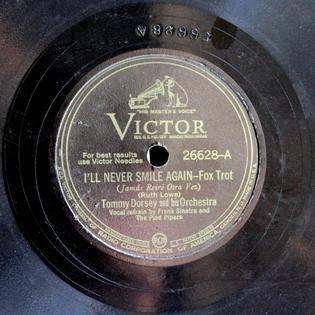
"I'll Never Smile Again" is a 1940 song written by Ruth Lowe. It has been recorded by many other artists since, becoming a standard.
"I Can't Get Started" is a popular song. It was introduced in Ziegfeld Follies of 1936 by Bob Hope and Eve Arden.

"I'm Glad There Is You " is a song written by Jimmy Dorsey and Paul Madeira first published in 1941. It has become a jazz and pop standard.

Annie's Cousin Fannie, which is sometimes listed as "Annie's Cousin Fanny", is a 1934 song composed by Glenn Miller and recorded by The Dorsey Brothers Orchestra for Brunswick and Decca Records. The Dorsey Brothers released two versions of the song in 1934 and 1935.
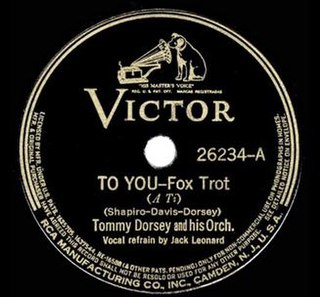
"To You" is a 1939 song composed by Tommy Dorsey with Benny Davis and Ted Shapiro. The song was a top 10 hit on the Billboard charts.

"You Taught Me to Love Again" is a 1939 song written and recorded by Tommy Dorsey and released as a 78 single.
John Marcus Lathrop was an American vocalist and guitarist with the Tune Twisters, Glenn Miller, and Hal McIntyre. Beginning around 1947, Lathrop was leader of the Drug Store Cowboys.

"This Is No Dream" is a 1939 song co-written by Tommy Dorsey with Benny Davis and Ted Shapiro and released as a 78 single by his orchestra.

"In The Middle Of A Dream" is a 1939 song composed by Tommy Dorsey, Einar Swan, and Al Stillman. The song became a Top Ten hit in 1939 when released by Tommy Dorsey and His Orchestra.
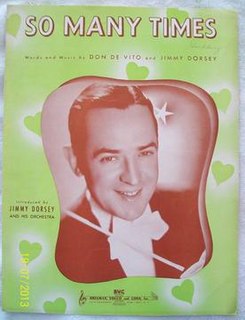
So Many Times is a 1939 song written by Jimmy Dorsey and Don De Vito. The song was released as a single in 1939 by Jimmy Dorsey and His Orchestra, becoming a Top 20 hit.
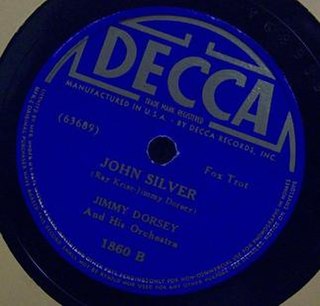
John Silver is a 1938 song written by Jimmy Dorsey with Ray Krise. Jimmy Dorsey and His Orchestra released the song as a 78 single on Decca in 1938.

"Tomorrow's Another Day" is a 1935 song composed by Glenn Miller for the Dorsey Brothers Orchestra. The song was released as a 78 single by the Dorsey Brothers Orchestra on Decca Records.

"Harlem Chapel Chimes" is a 1935 jazz instrumental composed by Glenn Miller. The song was released as an A-side 78 single by the Dorsey Brothers Orchestra.
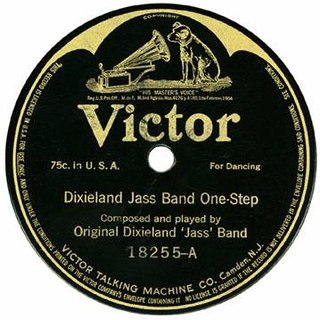
"Dixieland Jazz Band One-Step" also known as "Dixie Jass Band One-Step" and "Original Dixieland One-Step" is a 1917 jazz composition by the Original Dixieland Jass Band released as an instrumental as a Victor 78. The song is a jazz milestone as the first commercially released "jass" or jazz song.
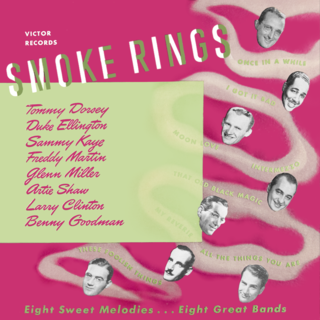
Smoke Rings is a compilation album of phonograph records released by Victor Records in 1944 featuring Swing-era recordings of eight bandleaders as a part of their Musical Smart Set series. The set was released in conjunction with Up Swing during the American Federation of Musicians strike and features popular recordings by the various artists.
















